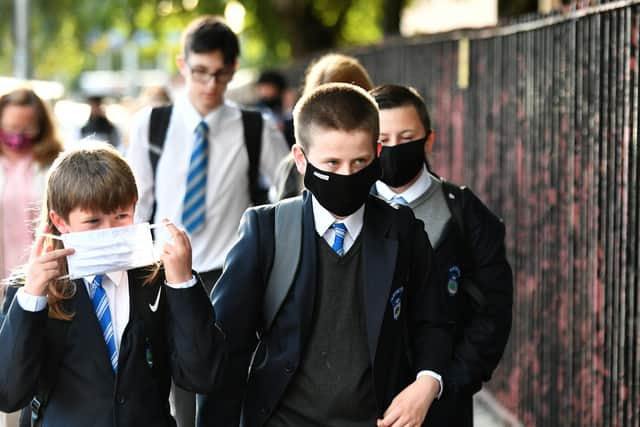Glasgow and Fife areas hardest hit by Covid-19 school absences
and live on Freeview channel 276
The analysis, carried out by Barry Black and Amy Lee Fraioli, adds further evidence to the suggestion Covid-19 could impact and widen the attainment gap in Scotland’s schools.
It follows similar analysis from the Scottish Conservatives earlier this month that showed the poorest pupils were more likely to be off school due to Covid-19.
Advertisement
Hide AdAdvertisement
Hide AdHowever the new statistics paint a stark picture of regional differences, with attendance down 8.55 per cent in Glasgow and 7.15 per cent in Fife.


This is in comparison to Edinburgh and Aberdeen where attendance is down just 0.8 and 0.75 per cent respectively when compared with data from 2018/19.
Older pupils in S4, S5 and S6 – those most likely to be sitting exams in 2021 – are also the most likely to be off, adding further fuel to fears of an impact to the attainment gap.
Mr Black, an education researcher at the University of Glasgow, compiled the data. He said: “This data clearly shows that the education experience of Covid-19 has not been equitable.
Advertisement
Hide AdAdvertisement
Hide Ad"We can see large regional differences in attendance data, with the most deprived areas of the country impacted the most. Further, we know that it is poorer, older pupils [who are] the most likely to be missing school.
“This data must really give us pause about what the pandemic may be doing in widening the attainment gap and having that at the forefront of our minds when making decisions.'
Scottish Labour’s education spokesman Iain Gray criticised the SNP’s handling of education while in power and called for “meaningful action” to tackle the impact of Covid-19 on the attainment gap.
He said: “These statistics lay bare the way the pandemic is making long-standing inequalities in education in Scotland worse by the day.
Advertisement
Hide AdAdvertisement
Hide Ad“The pupils of Scotland must not pay the price for SNP inaction. We have to see meaningful action now to address the impact of Covid on the attainment gap, starting with the publication of the long overdue equity audit promised by John Swinney.”
Earlier this month, the Scottish Conservatives released their own analysis, which showed attendance was down by 4 per cent for the poorest students compared to just 2 per cent for the least deprived areas.
Scottish Conservative education spokesman Jamie Greene said: “It’s extremely concerning that pupils from the poorest areas are more likely to be missing out on school than wealthier ones, and that prevalence of Covid-19 in deprived communities still appears to be stubbornly higher than in wealthier ones.
“The SNP have failed to close the attainment gap between the wealthiest and poorest pupils and this attendance gap will now only serve to widen it.
Advertisement
Hide AdAdvertisement
Hide Ad“If this pandemic results in poorer children falling further behind, that would be an unforgivable legacy and the government must act now to prevent that."
A Scottish Government Spokesperson said: “We know lockdown has been particularly difficult for pupils from disadvantaged backgrounds, and our Equity Audit next month will provide more detail on those issues.
"However, our commitment to ensure schools remain safe, open and welcoming is already enhancing the life chances of children and young people and starting to reverse any damaging impacts.”
A message from the Editor:
Thank you for reading this article. We're more reliant on your support than ever as the shift in consumer habits brought about by coronavirus impacts our advertisers.
If you haven't already, please consider supporting our trusted, fact-checked journalism by taking out a digital subscription.
Comment Guidelines
National World encourages reader discussion on our stories. User feedback, insights and back-and-forth exchanges add a rich layer of context to reporting. Please review our Community Guidelines before commenting.
